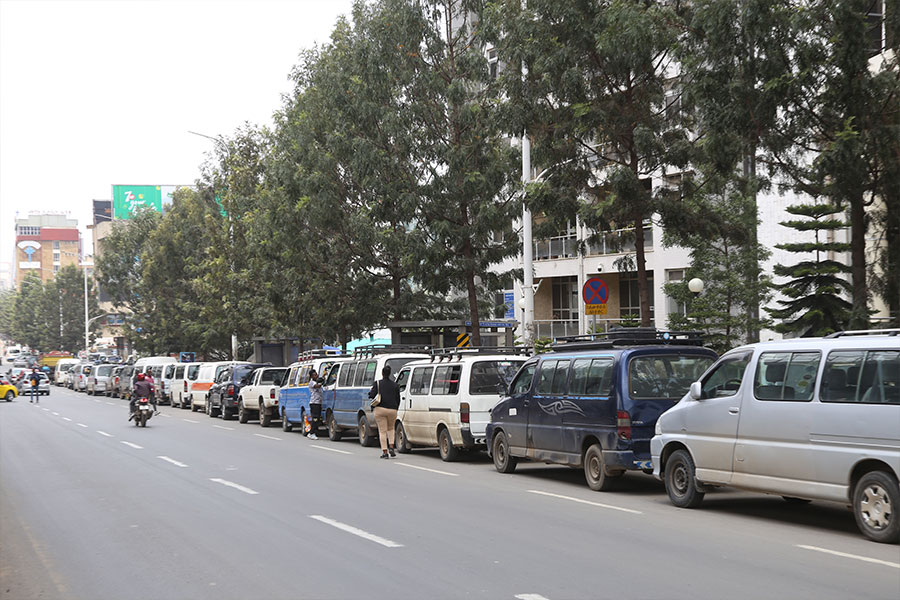
The Addis Abeba City Trade Bureau has designated six companies for the distribution of over three million litres of cooking oil from the Phibela Edible Oil Factory, a recently inaugurated plant in the town of Bure, Amhara Regional State.
A subsidiary of the Belayneh Kinde Group (BKG), Phibela has a daily production capacity of 1,500lt. The authorities believe it is a new entrant in the market that will help address the troubled edible oil supply and distribution business in Addis Abeba.
The distributors -Telsem Trading, ABTT Trading, Temesgen Kefyalew, New Trading, MCOFA Coffee Exporter, and NWG Trading - were selected by the Ministry of Trade & Industry. They will begin distributing the product to the 11 districts based on the quota allocation and price cap prepared by the City Trade Bureau.
Once the distributors deliver their quotas to the respective offices in the districts, the oil will be handed over to consumers associations, which will supply it to retailers.
Andnet Consumer Association is one of these cooperatives, which receives 54,000lts of semi-solid palm oil from the state at a subsidised price.
"Last month, we were only selling oil to kebele employees at the price of 350 Br for a five-litre bottle," Tewodros Eshetu, head of finance at the association, told Fortune. "Many people can't afford the liquid oil.”
Tewodros hopes oil from Phibela, deemed in better quality, would make a huge difference. Phibela offers its oil in bottles of varying sizes, with a five-litre bottle going for 232 Br.
"The distribution is scheduled to take place in the coming weeks, but we are facing problems in getting the oil from the factory," said Berhanu Tiruneh, general manager of ABTT trading.
Berhanu alleges that when his trucks went to Phibela to pick up the product, they were turned away.
Other distributors, however, have not reported facing a problem. Representatives from Phibela were not immediately available for comment.
The major source of the problem was that there were not many local plants producing edible oil, according to Akeberkegn Wegagen, deputy head of the Trade Bureau.
Phibela is among the 21 operational edible oil industries in the country that are producing 19.3 million litres a month using imported soybeans, sunflower and palm. On average, a person consumes 0.7lt of edible oil a month in Ethiopia, and the total demand in the country amounts to approximately 70.9 million litres. However, the overall supply sits somewhere around 47.7 million litres, satisfying only two-thirds of the demand.
Oil bottled locally can help regulate the flow of the distribution and save foreign currency for the country, according to Matiwos Ensermu (PhD), professor of logistics and supply chain management at Addis Abeba University. The increase in the number of distributors may be beneficial for edible oil to be distributed when needed, but local production alone is not sufficient to solve the problem of supply and distribution in Ethiopia, according to Matiwos.
"Technology should play a larger role in the distribution process," argued the expert.
He cited that introducing a digital tracking system would allow for better control and regulation of stocks and demand and make it easier to predict the future.
PUBLISHED ON
Apr 17,2021 [ VOL
22 , NO
1094]

Radar | Apr 24,2023

Fortune News | Jul 02,2022

Radar | Jul 09,2022

Radar | Apr 03,2023

Radar | Feb 19,2022

Dec 22 , 2024 . By TIZITA SHEWAFERAW
Charged with transforming colossal state-owned enterprises into modern and competitiv...

Aug 18 , 2024 . By AKSAH ITALO
Although predictable Yonas Zerihun's job in the ride-hailing service is not immune to...

Jul 28 , 2024 . By TIZITA SHEWAFERAW
Unhabitual, perhaps too many, Samuel Gebreyohannes, 38, used to occasionally enjoy a couple of beers at breakfast. However, he recently swit...

Jul 13 , 2024 . By AKSAH ITALO
Investors who rely on tractors, trucks, and field vehicles for commuting, transporting commodities, and f...

Jun 28 , 2025
Meseret Damtie, the assertive auditor general, has never been shy about naming names...

Jun 21 , 2025
A well-worn adage says, “Budget is not destiny, but it is direction.” Examining t...

Jun 14 , 2025
Yet again, the Horn of Africa is bracing for trouble. A region already frayed by wars...

Jun 7 , 2025
Few promises shine brighter in Addis Abeba than the pledge of a roof for every family...